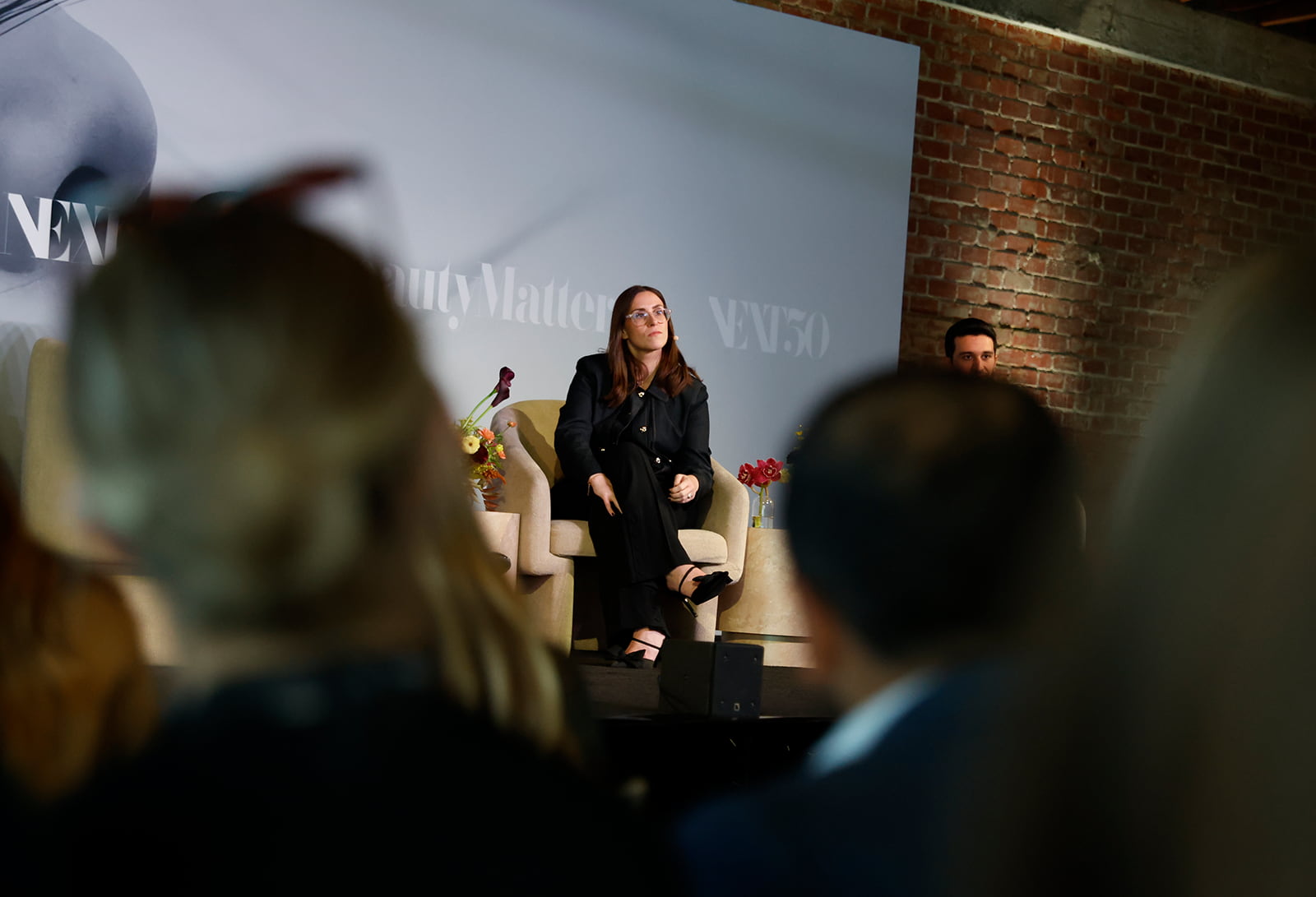Key Takeaways:
As beauty brands look increasingly beyond their home markets, international retail partnerships have become critical to scaling, storytelling, and sustaining relevance globally. Moderated by BeautyMatter President John Cafarelli, the “Retail Without Borders: Strategies for Global Beauty Growth” panel at the NEXT50 Summit in LA, gathered three executives shaping beauty retail across regions: Shannon Monteith, Category Director of Makeup and Fragrance at SpaceNK (UK); Stefanie von Albert, EVP of Assortment and Purchasing at Douglas Group (Europe); and Mohammad AlShammari, International Business Development Manager at Boutiqaat (Middle East).
The conversation unpacked how beauty is discovered, localized, and sold across diverse markets, and what brands must understand before going global.
Global Trends Reshaping Beauty Retail
Across all markets, digital acceleration, cultural fluency, and storytelling emerged as the defining drivers of global retail today.
Monteith described the UK beauty customer as “incredibly engaged, highly educated, and impatient.” With TikTok-driven discovery compressing the traditional purchase funnel, SpaceNK’s challenge is to stay “first to market and speedy,” without compromising its reputation for expert curation. “The customer wants what they see online immediately,” she noted, emphasizing that storytelling and community connection have never been more critical.
Von Albert offered a panoramic view from Douglas’ 1,900 stores across 22 European markets. “We’re seeing polarization,” she said, both across demographics and price points. “The younger and older consumers are growing, while the middle is shrinking. You either need to be highly premium or offer true value for money.” The common denominator, she added, is authenticity. “If you have a strong story and know who you’re talking to, your customers will find you.”
In the Middle East, AlShammari described a market transformed by content creation and instant gratification. “It’s not ad-driven anymore, it’s influencer-driven,” he said. “Customers expect delivery in two days or less. They’ll order from three retailers and pay the one who arrives first.” The region’s growth is increasingly fueled by skincare and K-beauty, with young consumers driving demand.
What Makes a Brand Ready for International Retail?
When evaluating new brands, all three panelists underscored the importance of clarity, community, and localization.
At SpaceNK, “Product comes first,” Monteith said, “but what really impresses us is when a brand has built an ecosystem and can show how they’ll live within our environment.” With limited shelf space in boutique-style stores, SpaceNK looks for brands that have already refined their visual identity and storytelling across formats.
Von Albert described Douglas as “a one-stop gateway into Europe,” with support ranging from compliance and labeling to co-created 360-degree marketing plans. “We want to understand your brand deeply and set clear expectations,” she said. “And if you’re not quite ready for 1,900 stores, we can start you on Niche Beauty, our pan-European e-commerce platform.”
For AlShammari, the biggest mistake brands make when entering the Middle East is failing to localize campaigns. “You can’t copy-paste global creativity,” he warned. “The brands that win here, like Make Up For Ever, adapt their storytelling to our culture, creating campaigns for Ramadan, using local influencers, and speaking in our language.”
Balancing Legacy and Newness
Each retailer faces the perennial challenge of balancing commercial stability with innovation.
For Douglas, it’s a matter of preparation and partnership. “We’re not interested in short-term hits,” said von Albert. “We want to build something over time. Younger brands bring freshness, but the foundation is mutual understanding.”
Boutiqaat’s online model allows flexibility. “Our average basket is six items,” AlShammari explained. “We often see four legacy brands and two emerging ones. Customers come for what they know but stay to discover something new.”
SpaceNK, by contrast, must curate ruthlessly. “We have a loyal customer base and limited square footage,” Monteith said. “But those loyalists also buy into trending brands. For us, it’s about having a stringent point of view, which earns its place on the shelf.”


Defining Success and Taking Risks
For all three retailers, success is measured in collaboration and consistency rather than short-term sales spikes.
“We see ourselves as brand accelerators,” Monteith said. “We overinvest in launches, but alignment is key, knowing what success looks like for both sides.” Von Albert echoed the sentiment. “It’s all about preparation, goal-setting, and frequent check-ins. We invest in you as partners.”
Boutiqaat takes a longer view. “When we introduced K-beauty in 2018, it started slow,” AlShammari said. “Now we have over 180 Korean brands. Some things just take time to peak.”
Discovery and Experience: From Pop-Ups to Play Zones
Von Albert shared that Douglas drives discovery through experiential education. “We have skincare and makeup schools where customers learn by doing,” she said. Pop-ups remain a creative canvas. “We’ve hosted cafés, discos, and immersive fragrance experiences.” But digital remains central; Douglas leverages its 60 million-member CRM for personalized outreach.
At SpaceNK, discovery is being reimagined physically. Its new Oxford Circus flagship features a “play space,” complete with a “sushi bar of fragrance” and interactive beauty stations. “We needed a dedicated zone for trending formats without disrupting our core,” Monteith said.
In the Middle East, discovery happens largely through influencer networks. “Consumers trust specific voices for each category—one for makeup, another for skincare, another for hair,” AlShammari said. “They no longer buy everything one influencer promotes; they’ve become experts themselves.”
Looking Ahead: Cultural Fluidity and Emerging Regions
In response to audience questions, panelists discussed the potential of Latin beauty on the global stage. Von Albert was optimistic. “We’re moving toward beauty without borders. K-beauty opened the door; Latin beauty could be next.”
Monteith agreed, citing “a customer more globally attuned than ever.”
The convergence of wellness and beauty is also accelerating. “The UK customer now wants to feel something from their products,” said Monteith. “Wellness is bleeding into every category.” Von Albert noted Europe’s cautious but growing interest in supplements, with Douglas testing the category via its online marketplace.
As for American beauty’s global reputation, all agreed it remains influential. “The cool factor is still there,” Monteith said. “Consumers still look to the US for newness,” von Albert added, “What’s exciting about US brands now is their diversity—there’s no one-size-fits-all trend.”
Across markets, one truth remains universal: Successful international growth demands both cultural fluency and operational excellence. The modern retailer is no longer just a distributor—they’re a translator, a curator, and a coauthor of how a brand lives in the world.
As Cafarelli summarized, “When a brand expands internationally, it’s not just entering a new geography; it’s reinterpreting how it shows up in that market.” And for brands seeking to thrive beyond borders, that reinterpretation may be their most powerful growth strategy yet.